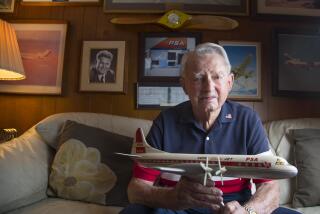For Lorenzo, Persistence Has Paid Off
- Share via
In the frenzied world of corporate takeovers, Francisco A. (Frank) Lorenzo has never been one to give up easily.
The hard-driving chairman and chief executive of Texas Air Corp. failed twice last year, losing bids to acquire Trans World Airlines and Frontier Airlines. In both cases, the carriers’ labor unions brought in other bidders rather than be taken over by Lorenzo, who has a reputation as anti-union.
But Lorenzo’s persistence now may pay off. With Texas Air’s agreement to buy Eastern Airlines in what would create the nation’s largest airline, based on 1985 revenue, he moves closer to ensuring his place as a survivor in the dog-eat-dog world of airline deregulation. Lorenzo has long maintained that only a handful of major airlines would survive and that Texas Air will be one of them.
The Eastern acquisition also would help ensure Lorenzo’s place as one of the most innovative and controversial executives in airline history--and one of the first to understand the implications of deregulation. As much as anybody, Lorenzo has helped change the face of commercial aviation since the industry was deregulated in 1978.
Recognizes Opportunity
“Of all the business people I’ve met, he is the most dedicated and decisive,” said Carl R. Pohlad, a Minneapolis banker and Texas Air director who has worked with Lorenzo for two decades. “He has the ability to recognize an opportunity and do something about it.”
The Eastern deal, Pohlad said, is such an opportunity. “We all know the industry is going to evolve into one with just four or five or six major carriers,” he said. “There are going to be a lot more mergers.”
The 45-year-old Lorenzo, born in the Queens section of New York to Spanish immigrant parents, helped pioneer the use of low fares as a competitive tool in 1977 when his tiny Texas International Airlines offered 50% discount “peanuts” fares.
Lorenzo again broke new ground in 1980 when he created New York Air, a low-cost carrier in the Northeast, as a completely separate subsidiary of Texas Air (the holding company Lorenzo formed out of Texas International). It was the first time an airline holding company expanded by creating an entirely new carrier rather than expanding its existing one.
Texas Air followed up that move last year by forming Continental West, a new airline whose low fares on the West Coast forced competitors to cut their fares.
But it was Lorenzo’s 1981 acquisition of Continental Airlines that made his greatest impact--and confirmed his reputation as a shrewd executive and hated union basher. His use of bankruptcy proceedings two years later to slash wages at Continental has transformed the carrier from a high-cost, money-losing outfit into one of the industry’s most profitable, earning $60.9 million last year.
“Continental’s been a remarkable turnaround story,” Michael Derchin, analyst at the New York securities firm of First Boston, said recently. Continental’s fare cuts--made possible by the wage reductions--have helped accelerate an industrywide pattern of cost-consciousness, putting pressure on other carriers to follow suit.
Forefront of Trend
And Lorenzo’s aggressive takeover strategy, illustrated by his recent TWA and Frontier bids, have likewise put him at the forefront of those carriers that have sought merger partners to survive and prosper.
Recent evidence of such a trend includes Northwest Airlines’ proposed acquisition of Republic Airlines, People Express’ purchase last year of Frontier (defeating Lorenzo’s bid) and United Airlines’ acquisition of the Pacific routes of Pan American World Airways.
But along the way to his successes, Lorenzo’s tough--some critics say ruthless--deal making has alienated many colleagues and labor unions. That was a factor behind Lorenzo’s losing his bid last year for TWA, subsequently won by corporate raider Carl C. Icahn.
“To say the least, Frank Lorenzo is not our favorite guy,” said J. B. Stokes, a spokesman for the Air Line Pilots Assn. local representing Eastern’s pilots. “In a general sense, we wish someone else would take over Eastern.”
But friends and colleagues said Lorenzo has handled his stress and unpopularity well, not taking it personally, and is likely to weather the tough negotiations with Eastern’s unions that lie ahead.
More to Read
Inside the business of entertainment
The Wide Shot brings you news, analysis and insights on everything from streaming wars to production — and what it all means for the future.
You may occasionally receive promotional content from the Los Angeles Times.









